Treatment descriptions
We will always do our best to explain to you why you need treatment and what different options you have available to you so you can make an informed choice. However, we do appreciate that it is difficult to remember everything we have told you, so this section of our website is aimed at giving you some basic information about why procedures are needed and how they are carried out. If you have any further questions, please get in touch – we'll be happy to help.
Ozone Therapy

Ozone kills >99% of all bacteria, fungi and viruses. The ozone therapy is based on ozone (O3) gas. Ozone forms part of the natural gas mix that surrounds the Earth at high altitude and protects the world population from excessive ultra-violet radiation.
That fresh, wonderful smell on the mountains when you ski or after thunderstorm is ozone.
The medical profession has used ozone for some 100 years for the elimination of all bacteria, viruses and fungus.
The dental use is for eliminating 99% of the micro flora and so the decay process halts, treatment of periodontal disease, root canal treatment and pre-post-washing of surgical sites.
Tooth Whitening

Tooth whitening is a great way of giving your smile a boost, erasing stains caused by tea, coffee, red wine and smoking and helping you to look younger by making your teeth look whiter and brighter.

Bonding

Bonding is used as a relatively simple method of disguising small defects such as chipped or crooked teeth or gaps between teeth.
This involves preparing your teeth with an etching solution, and applying special composite resin materials – very similar to those used for white fillings – to your teeth. We shape the resin to give a natural appearance and bond it into place, leaving you with a new improved smile. Because the procedure involves very little preparation, it does not usually need a local anaesthetic. The treatment is suitable for both adults and children.
Veneers

Veneers offer a great way of transforming your smile with just one treatment. They are very thin porcelain veneers which are specially adhered to the front of your teeth. Because they cover the whole front surface, they can hide many imperfections, from discoloured, chipped or cracked teeth through to crooked ones.
The procedure involves preparing your teeth by shaping them and taking a thin layer (1/3 – 1 mm) of enamel from the surface so they don't look or feel bulky once the veneers are in place.
We take an impression, or mould, of the area, which is then sent to our dental laboratory so the veneers fit well and look and feel natural.
Once ready, the veneers are bonded into place, becoming virtually part of your own teeth and giving you a beautiful, natural-looking smile.
Fillings

Fillings are one of the most basic methods of restoring teeth. They do exactly what their name suggests – they fill a hole in the tooth that has been caused by decay, playing an important role in helping us to keep a tooth for many more years.
At Cathedral Dental Practice, we use the most effective, modern, tooth-coloured materials. Unlike the more traditional grey amalgam fillings, the tooth-coloured ones look very natural, so no-one will be able to tell you have them.
We will numb the area around the affected tooth so you won't feel any pain, and will then remove the decay so the tooth can be filled. For tooth coloured-fillings, the material is placed into the hole in layers, with a special light being shone on each layer to speed up the setting process.
We will then shape the filling, so that it looks as realistic as possible, and so it does not interfere with the way your teeth meet when you bite and chew.
We use BPA free composite fillings.
Root Canal Treatment

Root canal treatment is needed when the pulp of the tooth becomes infected, either through decay or injury. The pulp is the soft bit inside the tooth, and runs right through the root, carrying the nerve supply and nutrients. When it becomes infected, that infection can spread throughout the root canal system of the tooth, and can cause an abscess which is usually extremely painful.
Abscess with swelling
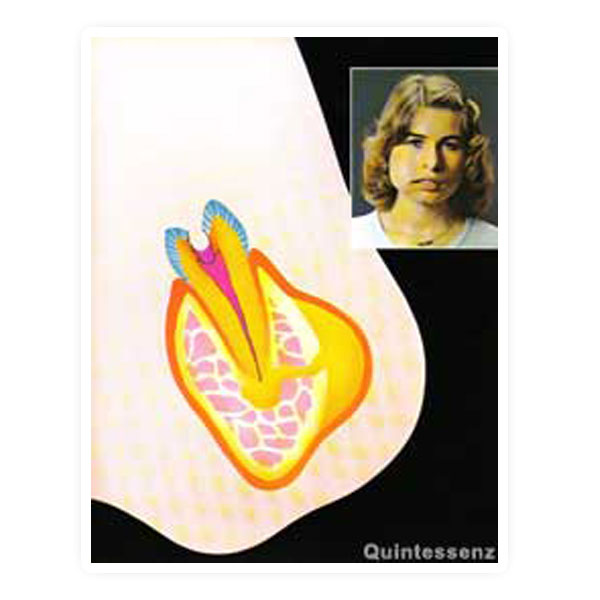
The toxins produced by the abscess in the infected tooth find their way into the bloodstream and are capable of causing disease within organs such as the heart, kidneys, lungs, etc.
Abscess is a central focus
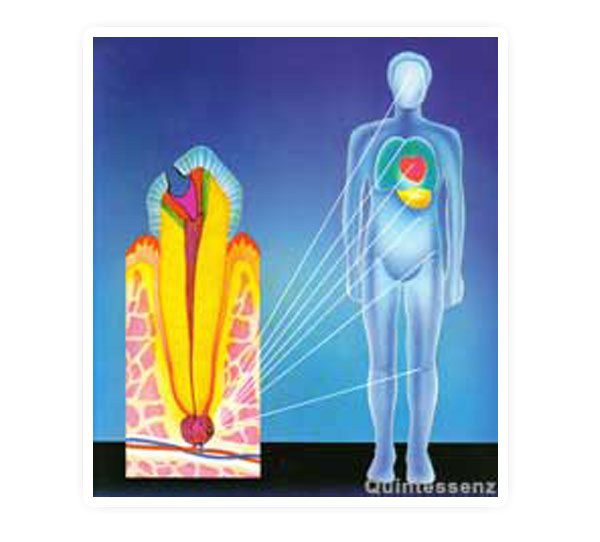
If left untreated the infection can lead to damage around the bone of the tooth, and the tooth is likely to have to be removed.
For root canal treatments we will refer you to a local endodontic specialist.
After the completion of root canal treatment, sometimes a filling will be all you will need, but often the root canal treatment weakens the tooth and it will need strengthening with crown or an inlay (when more than half of the tooth biting is damaged, we suggest for our patients an inlay. The inlay resembles a filling, in that it fills the space remaining after the decayed portion of the tooth has been removed. The difference is that an inlay (usually of ceramic) is shaped outside the patient's mouth and then cemented into place with dental cement.
Gold Inlay
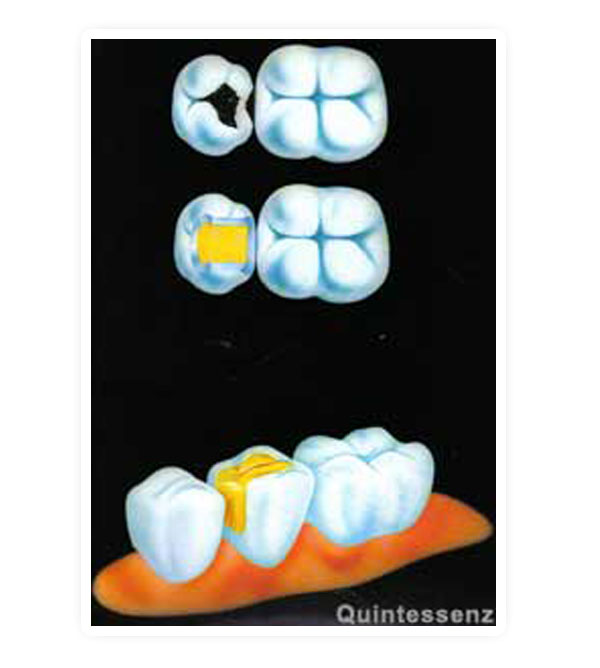
Dental plaque causes gum inflammation which can make teeth become loose and eventually make them fall out.
Crowns

A dental crown fits over the remaining part of a tooth, helping to strengthen it and making it look like a whole, natural tooth once more.
Crowns
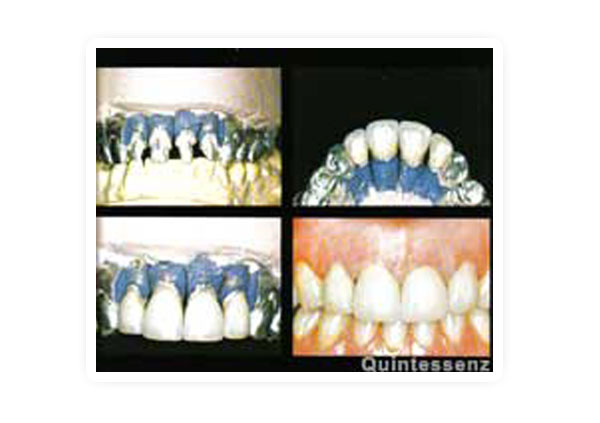
There are a number of reasons why we may recommend them. Your tooth may be very decayed and not strong enough to be filled any more, the top part of the tooth may have been accidentally damaged, or you may need one following root canal treatment. Crowns are also sometimes needed to help support a dental bridge.
Our crowns are created by experienced craftsmen working in a dental laboratory, who use natural-looking Zirconia to produce a crown which is strong, long lasting and virtually indistinguishable from your natural teeth. Zirconia is a biocompatible material, which is why we are keen to use it.
Zirconia-ceramic Crowns
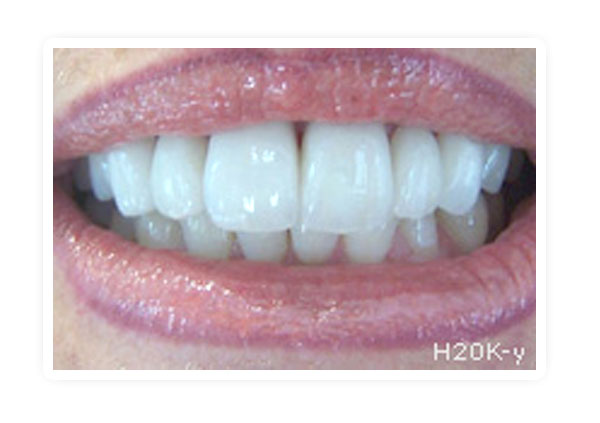
Bridges

Bridges are a permanent and realistic looking way of filling a gap between teeth caused by one or more missing teeth.
A bridge is a false tooth which is held in place by the teeth next to it. It is usually made of a precious metal base such as gold, with tooth-coloured porcelain bonded to any visible areas to make it look natural.
The bridgework
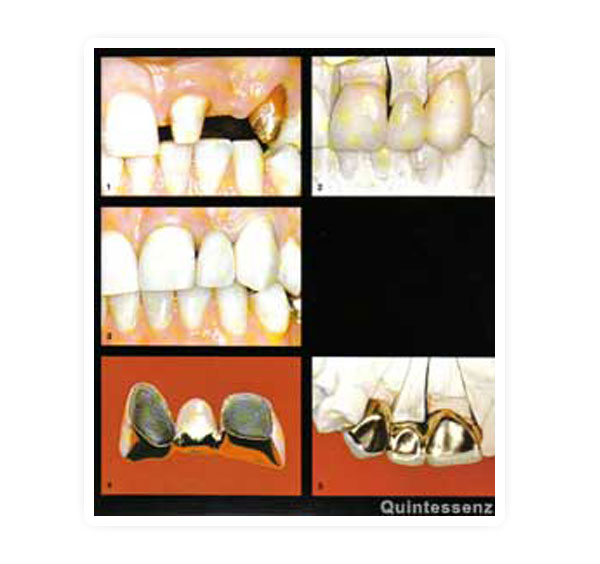
Most often, the two neighbouring teeth – one on each side – will need to have crowns fixed onto them. The two crowns are then joined together by placing the false tooth between them and cementing them in place. This is known as a fixed bridge.
Creating a fixed bridge is usually a good option if the teeth either side are strong enough to support the bridge, but are already crowned or have had large fillings.
Dental Implants

Why have dental implants?
Dental implants provide a realistic, strong and fixed way of replacing missing teeth. They can be used to replace a single tooth or a number of teeth, and can also be used as a much more comfortable and convenient method of keeping dentures in place.

A strong support for fixed replacement teeth
Implants are small devices which are, in effect, false tooth roots. They are placed carefully into the jaw bone and left in place until they bond with the bone. Below; cross section of the position of implants on model in lower jaw.

This creates a strong and permanent support for replacement teeth, which are hand-made by a specialist technician in a dental laboratory and specifically shaped and coloured to provide a perfect match to your other teeth. Crowns, bridges and denture reconstruction can be placed over the implants.
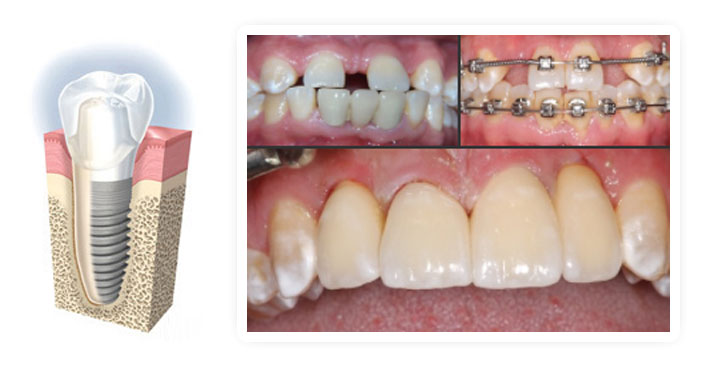
Metal-free zirconia implants
It is no longer necessary to have implants made from titanium or any other metal. At Cathedral Dental Practice in Portsmouth, we use metal free, ceramic, zirconia implants.
Properties comparable with a natural tooth
These metal free ZERAMEX®T implants are manufactured using zirconium oxide. Zirconium is an element found in the earth's crust, where the material, ceramic zirconium oxide, is extracted for a wide range of technical applications. The properties of zirconium oxide are comparable with a natural tooth.
The advantages of ceramic, metal free zirconia implants
The pioneering, sophisticated implant system is completely geared towards nature. It is technologically superior and produces aesthetically and cosmetically outstanding results.
The zirconia implants are made completely out of high-tech ceramic. The material is natural, compatible, break resistant and white, just like a natural tooth.
Zirconium oxide is not electrically conductive and it cannot sensitise the body. What's more, it does not cause any allergies. ZERAMEX®T implants have state-of-the-art biomechanical properties making them strong and stable.
Tried and tested
These zirconia implants have been tried and tested by the world's leading specialists and institutes and have been proven to be excellent in practice. The dental application of zirconium oxide has been extensively scientifically documented. ZERAMEX®T is quality-tested and internationally certified.
Are dental implants right for me?
If you would like more information about ceramic metal free dental implants to help you decide if they are right for you please contact our practice in Portsmouth and arrange an implant consultation. Our team will be happy to help with any questions you may have.
Dentures

Denture wearing is no longer the ordeal it used to be. Modern techniques mean they fit far better than they used to, and look far more realistic too. They are ideally suited to people with a number of missing teeth, or perhaps those on a limited budget.
Patients with a number of missing teeth which cannot be replaced in any other way can opt to have dental implants to hold them in place. This makes the dentures far more secure, and makes it easier to eat and speak with them in place.

Even if you have lost all your teeth, you will still need to visit us regularly to ensure that your dentures still fit properly, and also so we can check for signs of oral disease, including mouth cancer. You also still need to care for your mouth, brushing your gums, tongue and palate daily as well as cleaning your dentures thoroughly.
Tooth Extractions

Many people have to have a tooth removed at some time in their lives. This can be for a number of reasons. Some people have overcrowded mouths, and have some teeth removed as part of their orthodontic (teeth straightening) treatment. Sometimes teeth become too badly decayed or damaged to be repaired, and need to be extracted. Gum disease can, in its later stages, cause teeth to become so loose that they have to be taken out. And some people have to have their wisdom teeth removed, usually because they are growing in the wrong direction and are causing problems.
Upper right wisdom tooth in wrong position
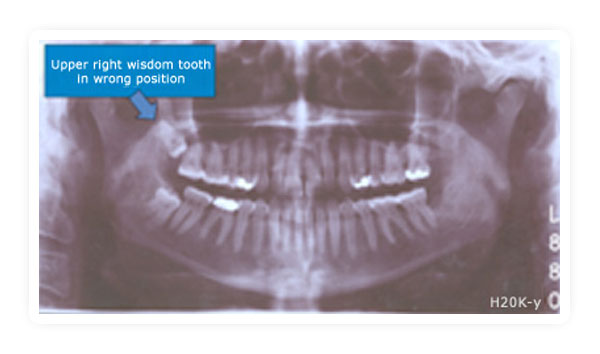
The procedure for removing a tooth is relatively simple from a patient's perspective. We will numb your tooth and the surrounding area with local anaesthetic, so you won't feel any pain. We will then hold the tooth firmly, and will ease it out. There will be some bleeding, but we will place a gauze pad in the tooth socket to help stop the bleeding. We will generally ask you to bite gently on this padding for about half an hour, after which you can take it out and throw it away. After the small surgical treatment we will give you guidance on how to look after the area.
Periodontics

Periodontics is the treatment of periodontal disease, commonly known as gum disease.
Gum disease affects the gums, bone and ligaments that support your teeth. These structures are the foundations which enable you to keep your teeth for life, but they can be damaged by bacterial infection.
It can affect one tooth or many, and if not treated can eventually lead to pain and tooth loss – in fact, it is the biggest cause of tooth loss among adults in the UK.
Gum disease caused by tartar
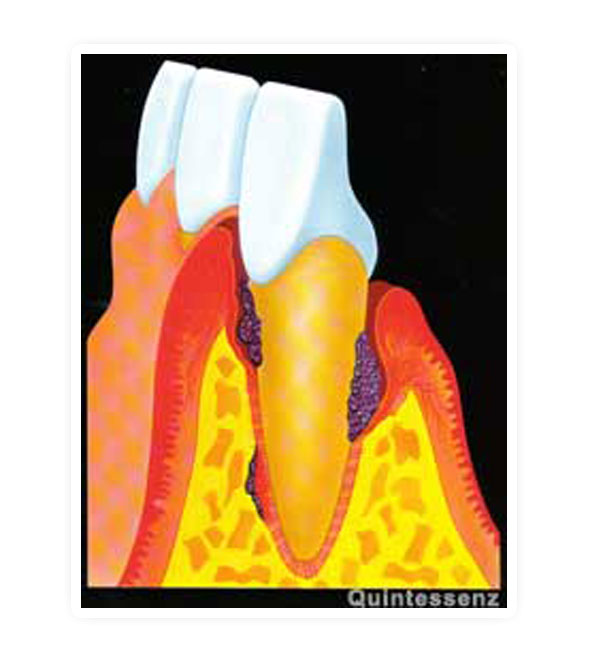
The damage caused is irreversible, but with proper treatment and after care further harm can be prevented.
We can offer specialised treatment for more severe cases of gum disease, which could ultimately make the difference between you keeping your own teeth or losing them.
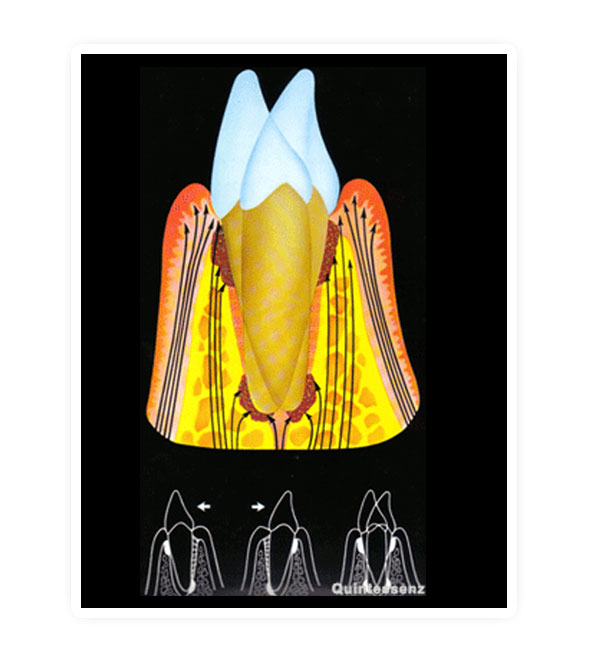
Dental plaque causes gum inflammation which can make teeth become loose and eventually make them fall out
Mouthguards

Mouthguards are an essential part of a sports kit these days, both for children and adults, particularly for contact sports such as rugby, boxing and martial arts, and those involving moving objects such as hockey, lacrosse and cricket.
We can provide custom-made mouthguards which fit comfortably and snugly, offering the maximum possible protection for your teeth.

Fissure Sealants

Fissure sealants are an ideal way of helping to prevent decay. They are a very thin protective layer which is painted onto the top surface of permanent molar teeth once they have come through. These teeth are particularly prone to decay as the top surfaces are covered in tiny fissures and grooves which are virtually impossible to clean with a toothbrush. Applying a sealant means bacteria and food remnants are unable to enter the fissures and grooves, significantly reducing the risk of decay. For more information, please ask us.
